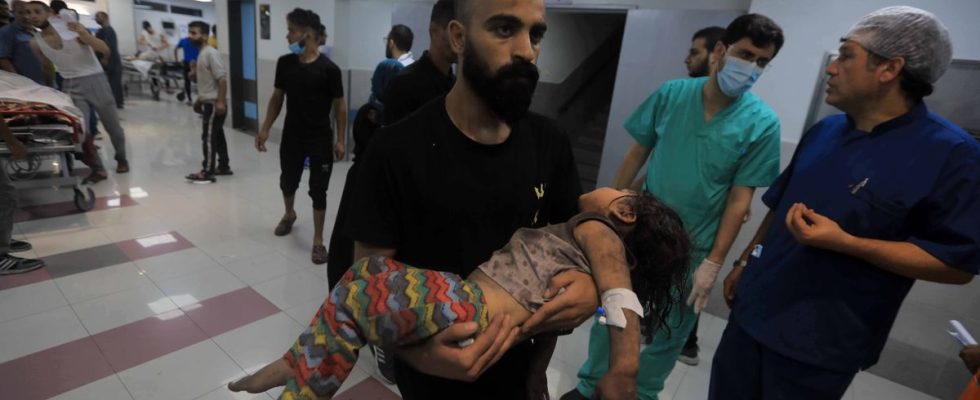Injured in vital emergency, polytraumatized. Since Saturday, around 1,350 Palestinians have died following Israeli airstrikes that pounded the Gaza Strip in response to Hamas attacks on Israeli territory. More than 6,000 Gazans were also injured. People who will be difficult to treat. Between a continuous influx of patients, a lack of water, electricity and incessant strikes, hospitals in the Palestinian enclave are overwhelmed and destitute.
“Not only are there too many patients compared to the number of medical staff, but the cases are also very serious,” explains Louise Bichet, head of the Middle East division of Médecins du monde. These are often people in life-threatening emergencies, others with multiple trauma, with fractures, head or abdominal trauma. »
“Even critical cases cannot be managed”
To make matters worse, relief is having difficulty deploying in the Palestinian enclave. “Given the large number of victims, it is physically impossible to send the number of emergency supplies necessary to care for these patients because the ambulances are overwhelmed and are having difficulty reaching patients and hospitals,” explains Guillemette Thomas. , head of medical operations in Palestine at Médecins Sans Frontières (MSF).
On Sunday, the association received, in its clinic in Gaza, a 12-year-old child with second-degree burns over a large part of the body. “His injuries would normally have required immediate hospitalization, but the hospital referred him to our MSF clinic because they were overwhelmed,” says Leo Cans, MSF head of mission for Palestine. However, we usually deal with lighter cases. This is an example which clearly shows that even critical cases cannot be managed” Among these injured, a majority of women and children, according to the NGO. “60% of patients”, according to Louise Bichet. In the MSF clinic in Gaza, all of the wounded received on Wednesday were aged 10 to 14.
“An ambulance was hit by a missile”
“The vast majority of patients who arrive at hospital require urgent care, and a large proportion of them need surgery, whether for life-threatening conditions or for major fractures,” underlines Guillemette Thomas. “But we are going to the most urgent, so for those who are not taken care of immediately, it is a major loss of opportunity. »
If the strikes destroy public infrastructure and homes, they also sometimes affect medical structures. “18 ambulances were hit by bombings between Saturday and Wednesday and two ambulance drivers were killed,” explains Leo Cans.
Doctors who cannot rest
An airstrike also hit the Indonesian hospital in northern Gaza on Saturday. “This caused significant damage to the hospital grounds and cost the life of a nurse,” adds the head of mission. An ambulance was also targeted by a missile, just in front of the emergency room at Nasser hospital. Many medical personnel were injured. » In total, eight health structures have been affected since the start of the conflict, explains Guillemette Thomas.
And airstrikes do not only have material consequences. Medical staff are exhausted. “You have to imagine that while they are not working, they are under bombs so they cannot rest as they should,” adds the head of medical operations in Palestine to Doctors Without Borders.
Water and electricity shortages
Continuous bombings and lack of space in hospitals are compounded by shortages. Medical staff already lack medicines and basic materials, but since Israel cut off all electricity to the Gaza Strip on Monday, the situation in hospitals could worsen. “The hospitals are operating on their reserves for the moment but, in the Shifa hospital for example, within two days, there will be no more fuel for the generators and therefore no more possibility of operating the hospital », warns Leo Cans. “Without electricity, for emergency operations, in an operating room, we will clearly change software, with a much lower percentage of success and life saving,” adds Louise Bichet.
Electricity is not the only thing lacking because the wells in the Gaza Strip operate thanks to it. “Water is going to be a huge challenge, not only for health structures but also for the population,” worries the MSF head of mission for Palestine. “Gaza was already on drip before the conflict. It only worked because there was food, water and electricity coming in from Israel. If access points remain closed, we are heading towards an unprecedented humanitarian and health catastrophe. We are unable to know what will happen next. But recent statements from the spokesperson for the Israeli army make us fear the worst. »

